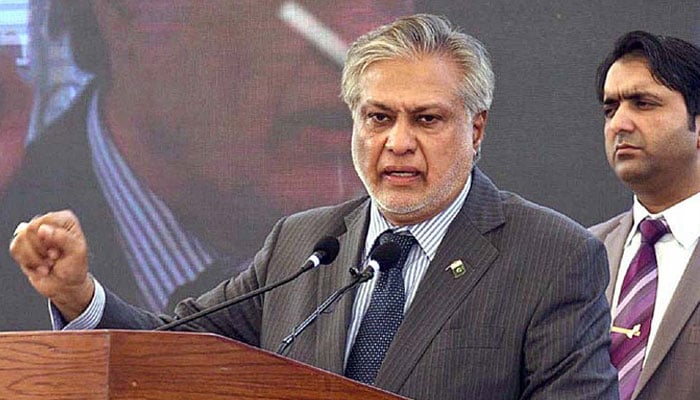 Web Desk
Web Desk

Finance Minister Ishaq Dar provided reassurance to the nation on Saturday, emphasizing that Pakistan would not default on its financial obligations. He pledged that the government had formulated long-term reform plans for the country’s improvement.
During a meeting with a delegation from the Karachi Chamber of Commerce and Industry in Islamabad, Dar stated, “Our main objective today is just to assure you that as your economic team, we are putting in all the efforts to get out of this [crisis].”
He expressed confidence in the government’s ability to introduce new ideas in the coming weeks, highlighting the upcoming budget and other initiatives aimed at the long-term betterment of Pakistan. Dar mentioned plans for an agricultural revolution and the creation of a sovereign wealth fund.
The minister’s assurances come amid the prolonged delay in signing an International Monetary Fund (IMF) staff-level agreement, which would provide $1.1 billion in financing as part of a $7 billion package for the cash-strapped nation.
Pakistan recently recorded its highest-ever annual inflation of 37.97% year-on-year. The finance ministry attributed the price hike to factors such as flood damages, disruptions in supply chains, macroeconomic imbalances, and political uncertainty.
Furthermore, the Oil & Gas Regulatory Authority (Ogra) has requested an increase in gas tariffs by 45% to 50% for all consumer groups across the country. This proposal aims to meet the revenue requirements of Sui Northern Gas Pipelines Limited (SNGPL) and Sui Southern Gas Company Limited (SSGCL) during the fiscal year 2023-24.
Acknowledging the burden imposed by tough economic decisions, Dar affirmed that the government’s top priority was to ensure timely fulfillment of Pakistan’s sovereign commitments. He claimed that Pakistan had never defaulted on any of its obligations and emphasized the country’s substantial assets.
Dar reflected on the economic challenges faced in 2014 but highlighted the subsequent normalization of the situation. He asserted that Pakistan had become the “best economy in South Asia” with a policy rate of 6.5% when the current government assumed power.
The finance minister acknowledged the difficulty of managing economic crises but emphasized the government’s resolve to take responsibility and implement necessary reforms. He expressed optimism regarding future multilateral dealings and hoped to avoid any issues.
Finance Minister Ishaq Dar’s remarks aimed to instill confidence in the nation, assuring the public that the government was actively working towards overcoming economic challenges and ensuring Pakistan’s long-term prosperity.

